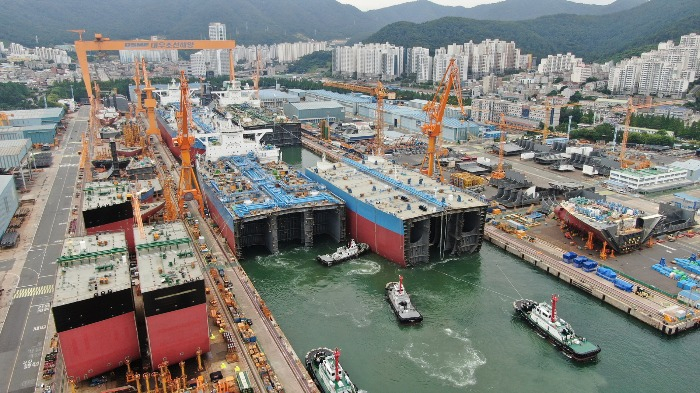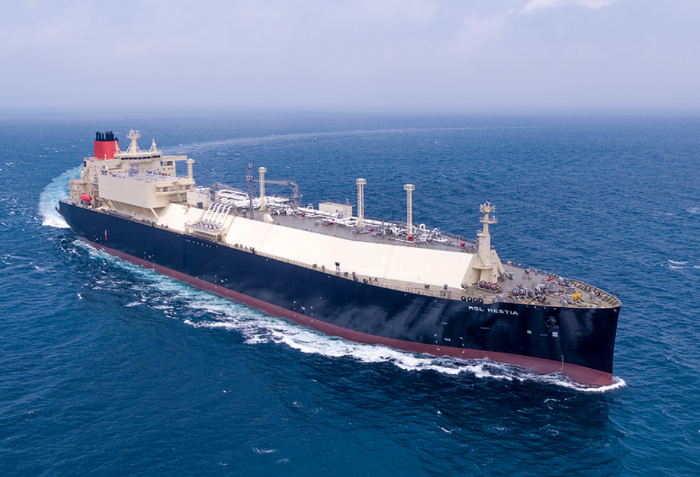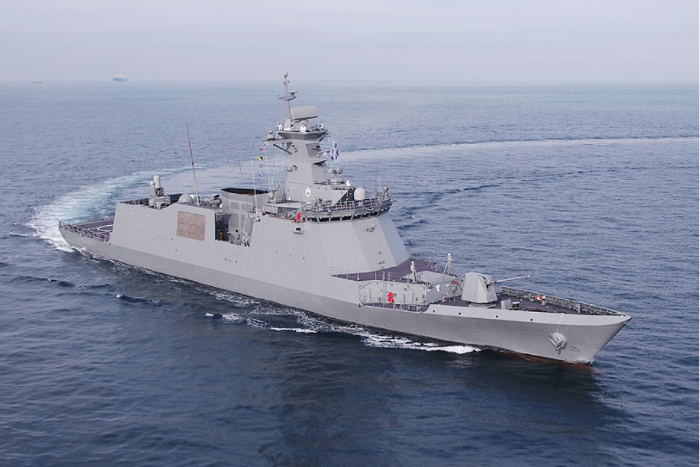Daewoo Shipbuilding may split up to find new owners
Subcontractors’ 51-day strike may force the government to inject more taxpayer money into the shipbuilder
By Jul 25, 2022 (Gmt+09:00)
LG Chem to sell water filter business to Glenwood PE for $692 million


Kyobo Life poised to buy Japan’s SBI Group-owned savings bank


KT&G eyes overseas M&A after rejecting activist fund's offer


StockX in merger talks with Naver’s online reseller Kream


Mirae Asset to be named Korea Post’s core real estate fund operator



South Korea is considering splitting Daewoo Shipbuilding & Marine Engineering Co. into two units to facilitate the sale of the debt-ridden shipbuilder, controlled by a state-run bank for over two decades.
Following the election of President Yoon Suk-yeol in March, his presidential transition committee has discussed an option to divide the world’s No. 2 shipbuilder into a defense-related unit and commercial vessel operation, a senior committee official told The Korea Economic Daily on Sunday.
But the committee has kept the proposal under wraps in view of a possible backlash from the company’s labor union and residents in Geoje, South Gyeongsang Province, home to Daewoo’s shipyard.
Korea Development Bank (KDB) has held a 55.7% stake in Daewoo Shipbuilding since 2000, in the wake of the Daewoo Group’s collapse in 1998. Since then, the government has injected 12 trillion won ($9.2 billion) in taxpayer money into the troubled shipbuilder.
After two previous attempts at selling Daewoo faltered in 2008 and early this year, KDB focused on normalization of the company before putting it back up for sale.
But the recent 51-day strike by Daewoo’s subcontractors, who occupied the shipbuilder’s main dock, prompted the government to revisit the privatization plan for Daewoo amid a sharp increase in the latter's debt.
The walkout, which ended last week, caused 713 billion won in lost production, according to the government and Daewoo. The losses are likely to surge to 1 trillion won when including penalties for delayed deliveries to clients.
That would require the injection of more state funds into the company to keep it afloat.

NEW LEADERSHIP
A split-up of Daewoo Heavy may gain momentum under the leadership of Kang Seog-hoon, an economics professor, who took over as KDB's chairman last June.
Contrary to his predecessor Lee Dong-gull, who rejected a proposal to sell Daewoo to a foreign company, Kang could take a flexible approach to its privatization plan.
In 2016, the government had planned a break-up of Daewoo into a defense-related business and remaining ones.
At the time, the options on the table included dividing Daewoo’s business into good assets and bad ones.
But the proposal was put on the back burner on the premise that the divided entities might not fetch as much money as the government hoped, compared with selling the company as one unit. Concerns about possible opposition from Daewoo’s labor union also kept the company from moving forward with the proposal.
Last year, Daewoo swung to a loss of 1.8 trillion won, followed by a shortfall of 470 billion won in the first three months of this year. Its debt-to-equity ratio soared to 523.2% as of end-March 2022, compared with 144.1% as of end-2021.
Despite its thickest order book in eight years, massive debt and operating expenses outweighed Daewoo’s operating profit, coupled with price competition by its two local rivals – Hyundai Heavy and Samsung Heavy.

POSSIBILITY OF LIQUIDATION
Now that KDB declared it will no longer inject fresh money into Daewoo, the shipbuilder is likely to be forced to find a buyer to stay afloat.
The government plans to leave the door open for all possible options to privatize Daewoo Shipbuilding.
A senior government official dismissed a possible liquidation of Daewoo, given its far-reaching impact on Korea’s infrastructure business with potential for tens of thousands of job losses as a consequence.
Moreover, Daewoo is the world’s largest warship and submarine builder, ahead of its bigger rival Hyundai Heavy Industries Co.
When contacted for comment, KDB said that it will wait to make a decision pending the results of a third-party consulting firm’s review of the shipbuilder.
Write to Kyung-Min Kang and In-Hyeok Lee at Kkm1026@hankyung.com
Yeonhee Kim edited this article
-
 Mergers & AcquisitionsDaewoo Shipbuilding to look for domestic buyer: KDB
Mergers & AcquisitionsDaewoo Shipbuilding to look for domestic buyer: KDBJan 28, 2022 (Gmt+09:00)
2 Min read -
 Shipping & ShipbuildingHD Hyundai files complaint against EU's veto of DSME merger
Shipping & ShipbuildingHD Hyundai files complaint against EU's veto of DSME mergerMar 28, 2022 (Gmt+09:00)
4 Min read -
 Mergers & AcquisitionsHyundai Heavy, DSME merger falls through on EU veto
Mergers & AcquisitionsHyundai Heavy, DSME merger falls through on EU vetoJan 14, 2022 (Gmt+09:00)
5 Min read -
 Shipping & ShipbuildingBig 3 Korean shipbuilders win largest orders in 8 yrs
Shipping & ShipbuildingBig 3 Korean shipbuilders win largest orders in 8 yrsDec 31, 2021 (Gmt+09:00)
2 Min read -
 Mergers & AcquisitionsDelayed EU approval puts Hyundai-Daewoo shipbuilding deal at risk
Mergers & AcquisitionsDelayed EU approval puts Hyundai-Daewoo shipbuilding deal at riskOct 03, 2021 (Gmt+09:00)
3 Min read


